7-13-18
Three Days in the Country: The Good, the True, and the Beautiful
By Diane Sippl
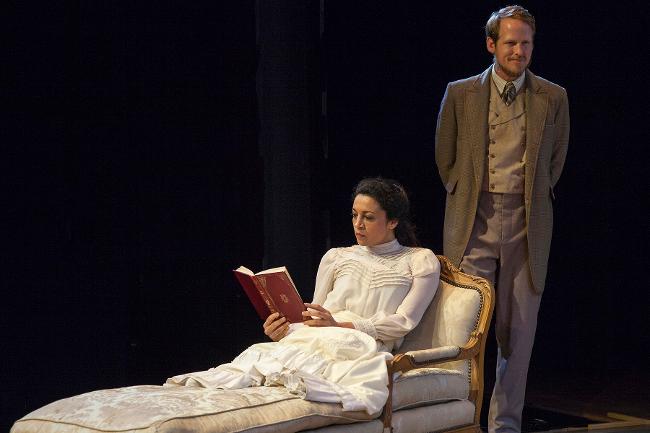
On a slow, sticky day in central Russia, 170 years ago or more (a hundred years before that it would have been much the same), a new young tutor on an isolated country estate draws the ladyfolk to him like flies to flypaper—not that he, Belyaev, isn’t pleasantly attractive. He appears sweetly romantic to the teenage Vera, sexy and seduce-able to the servant Katya, and malleable as a conquest to the matriarch Natalya Petrovna, given that her presumably workaholic husband is off “in the field” and her perennial gentleman visitor, whom she keeps at arm’s length for dallying, has once again become a bore.
These are the central characters in Patrick Marber’s 2015 version of Ivan Turgenev’s A Month in the Country, written between 1848 and 1850, which Marber has condensed and tailored to Three Days in the Country. As presented by the Antaeus Theatre Company—especially with the aid of three other characters, the socially inept Bolshintsov and the incompetent doctor in pursuit of the elderly dowager Lizaveta—the comic aspects are played up for farce and the work runs along at a clip that “tweets” for the likes of a social media audience. The dialogue allows for it: Turgenev is witty enough, and Marber effectively trims the banter for theatrical effect.
Director Andrew Paul stages the play with physical humor—Natalya’s little son armed with a bow and arrow (is he playing Cupid or slaying serf owners?), the fetching Katya slowly slurping a ripe plum to tempt Belyaev, smearing its juice on him, Vera skipping out to the meadow to fly a kite with the same young gent or diving into her bed with joy and kicking her feet in the air when she thinks Natalya Petrovna is marrying her off to Belyaev. My favorite is the more nuanced picture of three would-be male suitors—Rakitin the invited guest, Bolshintsov the neighbor, and Shpigelsky the doctor, facing us side-by-side on a bench, comrades-in-arms, consuming fresh-picked raspberries handed off to them in a basket, but one berry at a time, each man lost in contemplation of his failing romance. No one seems to love the right person in this play.
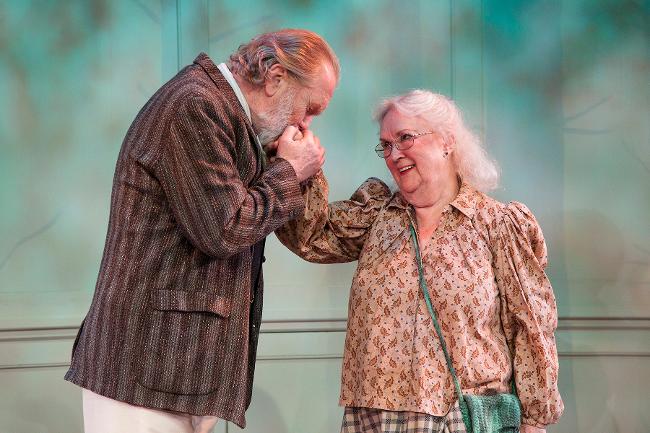
The audience bursts into applause in the middle of Act II as the doctor has presumed to propose to little Kolya’s snuff-sniffing piano teacher Lizaveta. Shpigelsky is too old to get down on one knee without suffering back spasms, but never mind, because in her scene-stealing line, Lizaveta judiciously responds, “I can live with my unhappiness. I don’t want to live with yours.” The dolce far niente of this nest of mid-19th-century romancers is entertaining enough—there are even two songs, performed with remarkable talent—and Corey Brill as Rakitin convincingly recalls Turgenev himself while Anna Khaja as Natalya Petrovna is anxious and brittle and finally neurotically narcissistic enough to evoke the crimes brought on by the “Superfluous (Wo)man” of the times.
But the center of it all, Belyaev, remains an enigma—or worse, a blank screen on which each distracted femme can project her fantasy. This is not to dismiss the empty-headedness of the ladies, but since Belyaev has relatively few lines and Peter Mendoza delivers them all but atonally, the wisdom of the play falls to the suave and urbane Rakitin. His dismay from the sidelines at the other characters’ follies and Corey Brill’s debonair couth here far surpass Leo Marks’ snarky quips in the double casting of the role. Rakitin’s scathing diatribe launched at his hostess is finally the heavy moment on the stage.
Yet was Turgenev’s play simply about the fickle hearts and clever machinations of a bevy of buffoons (be they dreamers or schemers or just pragmatic practitioners) in the swelter of deep summer? The “heat” can “do people in,” as Glendale theater-goers could testify, viewing the play in a month of 100º F weather. But let’s ask for more….
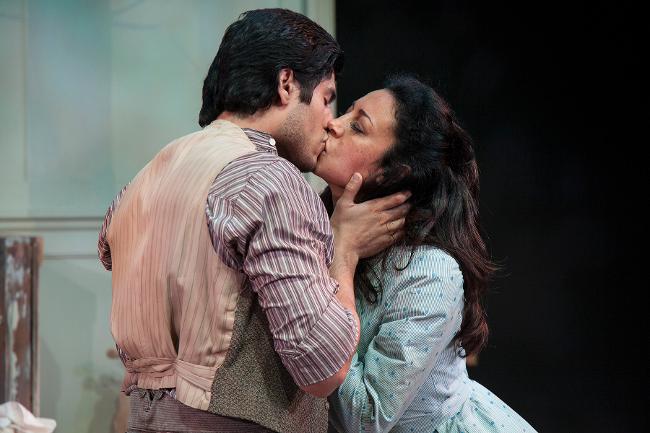
Regarding Goodness
I want above all to know what you are like, what are your views, your convictions, what you have become, what life has taught you.
The lowly clerk Mikhalevich to the troubled landowner Lavretsky in Nest of the Gentry by Ivan Turgenev
Take what you can yourself, and don’t let others get you into their hands; to belong to oneself, that is the whole thing in life.
Fallen aristocrat Sergei Nikolaevich Turgenev to his son, life-long writer Ivan Sergeyevich Turgenev
Regarding Truth
Beware of the love of women; beware of that ecstasy—that slow poison.
Sergei Turgenev to his son, Ivan Turgenev
It is not a good thing for an artist to marry. As the ancients used to say, if you serve a Muse, you must serve her and no one else. An unhappy marriage may perhaps contribute to the development of talent, but a happy one is no good at all.
Ivan Turgenev to a friend
Regarding Beauty
My feelings are all gloom and desolation. And yet I go out of my way to give polish and beauty to them; I search for images and comparisons; I like my phrases to be well-constructed and take a special pleasure in the ring and harmony of words.
Ivan Turgenev in his prose poem, The Cup
If you don’t respond to beauty, if you don’t love her wherever you meet her, beauty will elude you in your art.
Bersyenev to the young sculptor Shubin in On the Eve by Ivan Turgenev
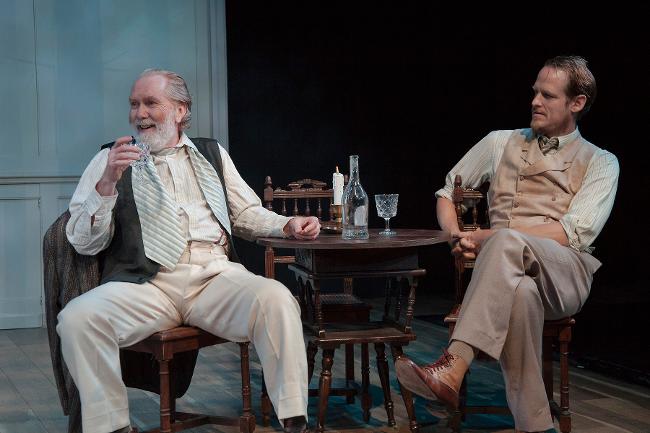
In 1860, a decade after he’d finished writing A Month in the Country (but over a decade before it was first performed, due to censorship), Ivan Turgenev’s character Bersyenev in his novel On the Eve spoke of a promising kind of love—“the love that unites, not the love that delights.” It could bring two people together out of sympathy, kindness, and respect. Yet in A Month in the Country, his only well-known work for the theatre, Turgenev created a pivotal female character who possessed none of these attributes; known as a “comedy,” the play reaches what looks like its singular scene of gravitas when the man who admires her most lets her know that she is capable of being neither good nor true. The problem is, he is smitten by her, regardless of the fact that she is married and raising a young son. Could it be her beauty?
The contradictions here start to unfold when we look at how, despite Turgenev’s claim that he would “cut the umbilical cord” between himself and his characters, he gave us a leading role that combined the woman he fled all his life and the woman he pursued all his life in one persona. And perhaps the hinge of this paradox—Turgenev himself—is where the biggest contradiction, and also the real gravitas of the play, presents itself. The woman, Natalya Petrovna, is bored out of her skin and viciously vain because she has nothing to do but to manage others—whatever suitors she can attract—while her husband manages hundreds of serfs on their large estate.
Turgenev himself was an aristocratic heir to an estate of thousands of serfs and grew up observing and loathing his mother’s tyranny over them. While he could flee from his home—to the civil service, to the university in Moscow, in St. Petersburg, in Berlin, and then to live abroad in Paris, Baden Baden, and London, there was one fact of his life he could not escape, a daughter he begot with a servant of his mother’s, a seamstress with whom he met “for a moment’s passion.” One reason he couldn’t answer for this deed was that he was not informed of its “result” until the child was eight years old, owing in part to the manipulation and cruelty of the mother from whom he had succeeded, he thought, in gaining his own freedom. Within this framework he had “abused” the very person (and class) for whom his sympathy aligned itself against his mother. His response at that point brings up the other side of the paradox.
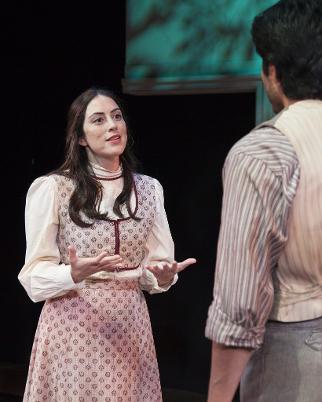
Turgenev’s solution was to send the child abroad to be raised by the woman he loved (the woman to whom he had fled), a renowned Spanish opera singer who lived happily and affluently with her French writer-critic-translator husband. Turgenev sought the company of this woman, Pauline Viardot, for 40 years, from his late adolescence until his death. Her beauty was not the conventional stage presence; she was often regarded as “homely,” exotic-looking at best. Actually, it is said that she resembled Turgenev’s mother, Varvara Petrovna, and not only physically—“Viardot was just as ugly and domineering.” Yet the singer’s many talents, her discipline and diligence, her ingenuity and resourcefulness, her stamina and her overall spirit, compelled him. Turgenev, a towering gentleman, elegantly dressed, found her “divine,” and her radiance allowed her to keep him at bay, at her disposal, and often under the conjugal roof subject to her whims, all the while he was her husband's best friend, a companion and confidant to them both.
Imagine the daily lifestyle of a diva who was among the most famous of her day, working with nearly every composer or musician or performer in Europe or Russia or America as well as the writers and artists of her husband’s circuit. She survived both him and Turgenev by 27 years, working in her late life as a teacher and composer until her death. But imagine, also, her role as the third mother for Turgenev’s daughter. “Paulinette Viardot,” as she was called, was not even a namesake for her new “mother,” Pauline Viardot; the girl had, ironically, already been named Pelageya (diminutive of Polina, Russian for Paulina) at birth. Some years after growing up in the Viardot household she was sent off to boarding school on her own and married—disastrously. She was forced to flee her husband’s violence and found little sympathy from her father, though he did send her money. Several accounts claim that Turgenev was also the blood father of Paul Viardot, son of Pauline, born in 1857, who is said to have sided with his “step-sister” Paulinette Viardot in a crucial financial dispute against Pauline because they felt themselves biological kin.
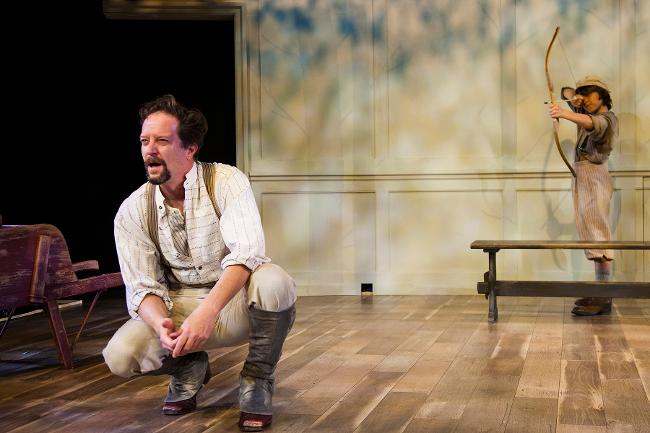
What is interesting is that all of this happened after Turgenev had written A Month in the Country (yet before it was successfully staged). And we see that with all the frivolity of the play’s action, the fun and games of lust and romance alike, something very deep courses through its conflict—the fate of an earnest young woman, with all the world open to her, who has, for all intents and purposes, been “sold off” to a mismatched marriage partner, the go-between winning three horses in the bargain, and the matronly stepmother ridding herself of her ward for the sake of a suitor’s attention, thereby ensuring that the whole cycle of sordid practices of the landed gentry and their subjection of peasants to vile servitude repeats itself—domestically, socially, and even psychologically in the real-life role of the playwright.
In the early 1840s of Russia when A Month in the Country by Ivan Turgenev (and presumably Three Days in the Country by Patrick Marber) takes place, the division between landowners and serfs, it’s important to remember, was akin to the difference between planters and slaves in the Americas. In his short stories alone Turgenev gives unforgettable evidence of the brutality that “masters” and “mistresses” exerted upon their serfs. A boy could be dismissed from the estate for failing to display the requisite smile and thus become a vagrant for life. A matriarch could prevent her serfs from marrying, or send them away to a prison or a settlement or Siberia for the smallest false move. Turgenev’s own mother supervised the “disciplining” of the serfs on her estate; once she commanded all the gardeners to be whipped when someone had picked an expensive tulip from the flowerbed. A few notes on Turgenev’s mother and father show us how not only his deepest concerns but also his temperament and behavior emerged from his childhood.
The estate where he grew up was the inheritance of his mother, Varvara Petrovna Lutinov, who had been born into a brutal family; Turgenev included murder and rape in telling their backstories, and Varvara herself had run away as a girl from her abusive stepfather. Nonetheless, the Lutinovs robbed their way to fortune, and Varvara could afford to marry a handsome and charming cavalry officer from an old family of intellectuals and diplomats in service of the czar even though they had lost all their money, aristocratic as they were. As for Varvara Petrovna herself, V.S. Pritchett, an editor introducing Turgenev’s novella, First Love, described her as “… one of those Russian Cinderellas who turn into arrogant viragos avenging their early miseries. Short, ugly, with glaring eyes under heavy brows, her mouth large, sensual and cruel, like many ugly women she could be charming, but her nature was violent and capricious.
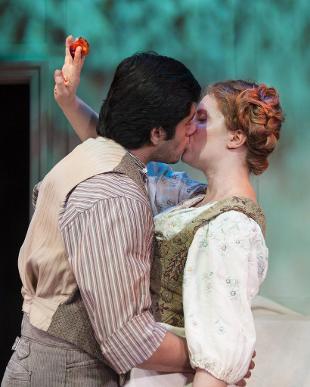
She ruled her huge estate with 5,000 serfs, which was almost a remote nation in itself, like an absolute sovereign…. She had forty house serfs in her mansion at Spasskoye and they included not only her maids and butler but tutors, her doctor, her clerks, her tanners, shoemakers, dressmakers, and papermakers, and her orchestra.”
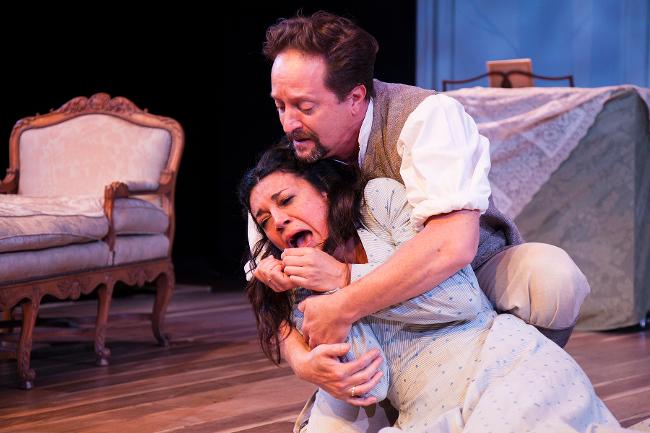
Her estate was at her command, but her husband was not, and he retired to the life of a country gentleman, riding, hunting, and pursuing women. When he was actually present in his own household, he merely looked on from the sidelines; at any rate, he died young. Varvara Petrovna vented her frustration on her sons, especially Ivan, “birching” him as a child and flirting with him as a young man, then using him as a mediator between herself and the servants. Always depriving her two sons of money, she tried even on her deathbed to rob them of their inheritance from their father. It would not be difficult to imagine that any spinelessness or evasiveness, any tendency toward submission Ivan Turgenev displayed in his life, stemmed from a mother who made it her mission to break his will, and any guilt or fear he acquired in relation to women was a reaction to a womanizing father who had not the power to stand up to his own wife and simply dodged her. It’s also interesting to note that Turgenev, following his father’s lead, fathered at least two children by peasant women and also had an illegitimate step-brother. Yet Ivan Turgenev, it could be said, used literature to retaliate against his parents, for history tells that A Hunter’s Sketches, an album he wrote beginning in his late twenties, achieved more for the emancipation of serfs than any other piece of Russian protest.
In 1850, the same year he completed A Month in the Country, Turgenev wrote his “Diary of a Superfluous Man,” coining the term for one who craved useful activity and strived for lofty ideals but also displayed spiritual lassitude and anemia of the will. The Superfluous Man was aware of his singular abilities and of his superiority over his native milieu (as were nobles or landed gentry and even those estranged from Russian life), yet at the same time was overcome with skepticism and a perpetual conflict between words and actions. Just two years later in 1852, A Hunter’s Sketches was first published.
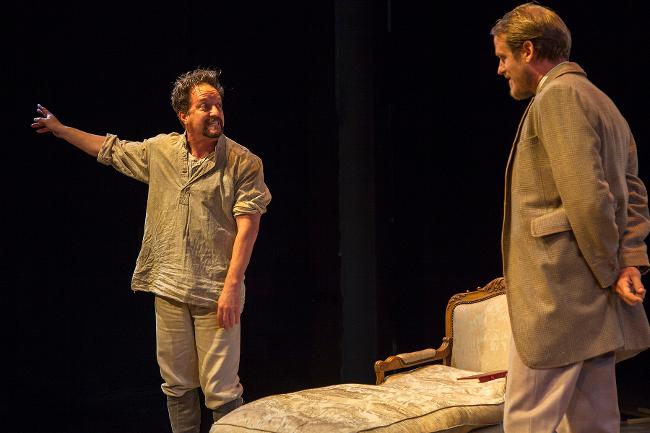
All three of these works were written by Turgenev during the years when he first left Russia to live in Europe “in the train of the Viardots,” as Flaubert, his good friend, later put it. And well did Flaubert know, as did everyone in the arts of the time, that the Viardots, Pauline in music and her husband Louis as a writer, critic, translator, and impresario, did everything they could to spread Russian culture abroad. At Courtavenel, Pauline Viardot’s house outside of Paris, Turgenev may have lived smitten by a married woman, but he was surely also struck by her conviction and practice of putting her art before all else. Her life could not have been more active and dynamic in pursuit of its single purpose. The opera singer lived for her art, and just as Louis Viardot, her husband and theatrical manager, knew this, and lived for her, perhaps that desire alone—to reach the highest of one’s creative powers—couldn’t have been a bigger inspiration for the 29-year-old Russian writer who found every reason to leave his homeland only to make what he later considered his biggest contribution to it. If he had unconsciously registered a déjà vu of his mother’s command in Pauline Viardot and of his father’s weak-willed whims in his own offspring, Ivan Turgenev had also consciously and successfully launched his career, his own domestic life, and his legacy through his search for the good, the true, and the beautiful in this pan-European “nest of gentry.”
Three Days in the Country
Playwright: Patrick Marber adaptation of A Month in the Country by Ivan Turgenev; Director: Andrew Paul; Scenic Design: Se Hyun Oh; Costume Design: A. Jeffrey Schoenberg; Lighting Design: Jared A. Sayeg; Sound Design: Chris Moscatiello; Props Design: Erin Walley.
Cast: Anna Khaja, Corey Brill, Daniel Blinkoff, Chelsea Kurtz, Peter Mendoza, Harry Groener, Dawn Didawick, Alberto Isaac, Patrick Wenk-Wolff, Reba Waters Thomas, Elijah Justice, John Bobek, Ellis Greer.
Antaeus Theatre Company, at the Kiki & David Gindler Performing Arts Center, 110 E. Broadway, Glendale, CA 91205
Box Office: (818) 506-1983 or www.antaeus.org July 5–August 26, 2018